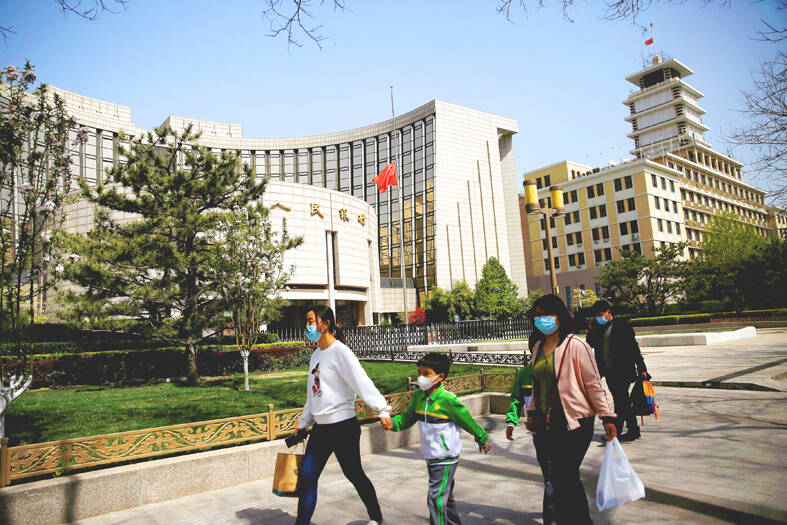People’s Bank of China (PBOC) Governor Yi Gang (易綱) said the central bank’s attention is to be centered on economic growth, a sign policymakers might shift gear toward supporting economic recovery as the nation gradually eases COVID-19 controls.
“Our focus is growth right now,” Yi said yesterday in a video speech given to a central bank conference in Bangkok. “We have a pretty accommodative monetary policy in place to help with economic recovery and [to] maximize employment.”
The growth rate is currently “somewhat slower than expected due to COVID and other factors,” Yi said, adding that inflation has been relatively subdued, and it would likely remain in a “moderate range” next year.

Photo: REUTERS
The central bank recently surprised market watchers by cutting the reserve requirement ratio for banks — unleashing more cash that banks can use for lending.
Economists expect the central bank to keep monetary policy relatively loose into early next year.
Speculation is also growing the Chinese Communist Party’s politburo, its top decision-making body, would likely signal a more pragmatic approach toward COVID-19 controls during its meeting this month, while placing greater focus on boosting growth.
Yi’s comments “confirmed the recent shift of policy focus to growth after the party congress” in October, Mizuho Bank foreign exchange strategist Ken Cheung (張建泰) said.
“In addition to the COVID policy, the reform in the property market has yielded progress and the PBOC is set to maintain its easing bias to support the property sector and boost growth after COVID hit,” he said.
Chinese stocks traded 0.4 percent lower yesterday after gaining in the previous three sessions.
The relaxation of some COVID-19 curbs and a shift in the official rhetoric around “zero COVID” has fueled hopes that the country might be preparing to reopen next year.
However, the economic recovery would remain bumpy, with growth likely to come in below 5 percent next year, economists surveyed by Bloomberg said.
The economy is forecast to expand 3.3 percent this year, which would be the second-slowest pace since the 1970s after 2020.
Aside from quantitative monetary policy tools, the central bank is also making use of structural instruments to boost its support to small businesses, the agriculture sector and private firms, Yi said.
The governor’s comments were part of a panel with other central bankers hosted by the Bank of Thailand and the Bank for International Settlements.
European Central Bank President Christine Lagarde, Reserve Bank of Australia Governor Philip Lowe and Bank Indonesia Governor Perry Warjiyo attended the event.
Yi called for stronger collaboration between advanced and emerging economies on macroeconomic policies, as indicators point to a rising possibility of a global recession next year.
Many emerging markets and low-income countries are facing pressures from depreciating currencies, capital outflows and inflation, he said.

TRADE WAR: Tariffs should also apply to any goods that pass through the new Beijing-funded port in Chancay, Peru, an adviser to US president-elect Donald Trump said A veteran adviser to US president-elect Donald Trump is proposing that the 60 percent tariffs that Trump vowed to impose on Chinese goods also apply to goods from any country that pass through a new port that Beijing has built in Peru. The duties should apply to goods from China or countries in South America that pass through the new deep-water port Chancay, a town 60km north of Lima, said Mauricio Claver-Carone, an adviser to the Trump transition team who served as senior director for the western hemisphere on the White House National Security Council in his first administration. “Any product going

High above the sparkling surface of the Athens coastline, the cranes for building the 50-floor luxury tower centerpiece of Greece’s future “smart city” look out over the Saronic Gulf. At their feet, construction machinery stirs up dust. Its backers say the 8 billion euro (US$8.43 billion) project financed by private funds is a symbol of Greece’s renaissance after the years of financial stagnation that saw investors flee the country. However, critics see it more as a future “ghetto for the rich.” It is hard to imagine that 10km from the Acropolis, a new city “three times the size of Monaco”

STRUGGLING BUSINESS: South Korea’s biggest company and semiconductor manufacturer’s buyback fuels concerns that it could be missing out on the AI boom Samsung Electronics Co plans to buy back about 10 trillion won (US$7.2 billion) of its own stock over the next year, putting in motion one of the larger shareholder return programs in its history. South Korea’s biggest company would repurchase the stock in stages over the coming 12 months, it said in a regulatory filing on Friday. As a first step, it would buy back about 3 trillion won of paper starting today up until February next year, all of which it would cancel. The board would deliberate on how best to effect the remaining 7 trillion won of buybacks. The move

In a red box factory that stands out among the drab hills of the West Bank, Chat Cola’s employees race to quench Palestinians’ thirst for local products since the Gaza war erupted last year. With packaging reminiscent of Coca-Cola’s iconic red and white aluminum cans, Chat Cola has tapped into Palestinians’ desire to shun brands perceived as too supportive of Israel. “The demand for [Chat Cola] increased since the war began because of the boycott,” owner Fahed Arar said at the factory in the occupied West Bank town of Salfit. Julien, a restaurateur in the city of Ramallah further south,